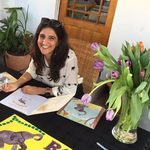Living in Botswana means her days are powered by sunshine and lots of time outdoors. When she's not at work, she is taking walks in her beautiful garden with the most stunning sunsets and starry, moonlit skies. On weekends, you will find her horse riding with her daughter.
What was the moment, realisation or a person that made you excited about education in the first place?
I’ve wanted to be a teacher since I was little and did voluntary work in teaching from when I was just 12 years old… I trained to be an English Teacher for high school students, but over the last 8 years...
I’ve understood the incredible importance of early childhood education as the foundation for wellbeing and success, especially as I became a mum.
My children are 8 and 5, and I don’t want their access to quality early learning to be a luxury. They have developed through nurturing care and play, and I have seen how powerful play can be. It’s transformative. Yet I have also seen first-hand that access to this kind of care and learning is not an option for many families in Africa. It is my mission to change that.
Where do you see the biggest opportunities for innovators in your region?
Here in Botswana, we’ve been so focused on health based innovations and programmes for youth especially based on entrepreneurship and employment, or primary school programmes for literacy and numeracy, that Early Childhood Education is completely underserved. I see this as a huge opportunity for all of us in education and policy as it lays the foundation for lifelong learning and success.
What are the challenges that slow down innovation in your context?
Tedious bureaucracy truly hinders innovation and implementation of creative solutions.
Mobile technology is expensive and not accessible in many parts of the country yet so this means tech-based solutions can’t always be implemented, making scaling innovations a bit harder especially as the country is so large and access to rural communities and those on the margins becomes even more difficult.
What little or big part do you want to play in improving education?
Less than 25% of children in Africa have access to early childhood education opportunities, but we also know that 90% of our brains develop by the time we are 5 years old. Children who attend pre-primary programmes are more likely to stay in school, gain social and emotional skills, find employment and break cycles of poverty and crime.
This knowledge compels us to act, and to act differently. I hope to inspire women across the continent to be creative and playful with their children.
Mothers demonstrate the potential of possibility and childhood ambitions - and through the work we do at Learn To Play, I aspire to be a part of nurturing their skills, creativity and entrepreneurial spirit. By supporting families and caregivers through parenting programmes, we can genuinely transform their despair into dignity, their fear to joy.
Who would you like to see joining the HundrED community to accelerate the pace of change?
We need to see more policy makers and governments join the HundrED community, as well as leaders from all walks of society and industries who influence change. Advocates for early education, girls' education, and prioritising sustainable, scalable solutions need to be given platforms, like HundrED, to share their voices.
How does a future worth aspiring look to you?
I dream of a world where quality early childhood education is not a luxury, where play is seen as valuable and a world where governments prioritise our youngest citizens… through parent/caregiver support, better policies for maternity and paternity leave, accessible childcare for working parents - especially for working mums, urban design that includes safe spaces for young children and so much more!
Connect with Priyanka on LinkedIn
If you are interested in joining the HundrED community, you can find more information here.




